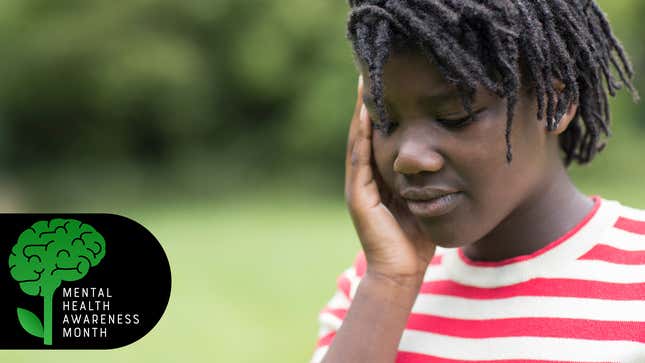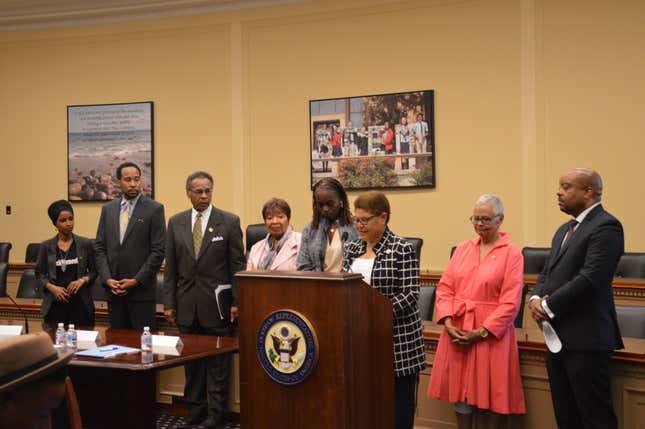
The rise in the suicide rate for black children ages 5 to 12 is an overlooked national emergency, according to a panel convened by the Congressional Black Caucus on the eve of Mental Health Awareness Month.
Chaired by Congresswoman Bonnie Watson Coleman (D-NJ), the CBC Task Force on Black Youth Suicide and Mental Health brought together experts in Washington, D.C., to raise awareness among members of Congress and staff, and to identify legislative recommendations to address this mental health crisis.
According to a 2008 JAMA Pediatrics article on Black Boys and Suicide, suicide rates in the United States have traditionally been higher among white than black individuals across all age groups. However, in the last 25 years, suicide rates have increased among black children aged 5 to 11 years and decreased among white children of the same age.
“We can no longer stand aside and watch as the youth in our community continue to struggle with depression, traumatic stress, or anxiety. Far too often the pain that African Americans experience is either overlooked or dismissed,” Rep. Karen Bass, CBC Chair, said during the panel. “That has to end today.”
“This shouldn’t be an issue that we need to commission a task force to address, but here we are. As a mother of a beautiful boy who is just entering his adolescence, I’m concerned. I know a lot of parents are,” noted Rep. Ilhan Omar (D-MN), Emergency Taskforce Chair Member.
In addition to Chairperson Watson Coleman, CBC members of the task force include: Alma Adams (D-NC); Emanuel Cleaver II (D-MO); Danny Davis (D-IL); Alcee Hastings (D-FL); Jahana Hayes (D-CT); Eddie Bernice Johnson (D-TX); Barbara Lee (D-CA); John Lewis (D- GA); Ilhan Omar (D-MN); Ayanna Pressley (D-MA); and Frederica Wilson (D-FL).
The working group hosted its first forum on Tuesday and heard from Rep. Bonnie Watson Coleman (D-NJ); Michael A. Lindsey, executive director at the McSilver Institute for Poverty Policy and Research at New York University; Dr. Alfiee Breland-Noble, CEO, the AAKOMA Project and Center, and Associate Professor, Georgetown Psychiatry; William B. Lawson, editor in chief, Journal of the National Medical Association; and David J. Johns, executive director, National Black Justice Coalition.

“High profile cases, like the deaths of McKenzie Nicole Adams and more recently Nigel Shelby, demonstrate how difficult it is to categorize the circumstances that are taking our children’s lives—there are elements of race, of trauma, of socioeconomic status, of sexual orientation and gender identity and many more issues at play. For any solution to be effective, it will need to be holistic,” Rep. Watson Coleman said. “Today, we begin the work of identifying the causes for this crisis, and how to formulate those solutions.”
“Over the next several months, in addition to events like this in Washington, D.C., we hope to bring what we learn to communities across the country, connecting parents and other community leaders to the knowledge and tools to be the ‘first responders’ who identify students at risk and get them the help they need,” Rep. Watson Coleman added. “With the help of a newly assembled working group, including the individuals joining us today, we will also work to assemble a report, hopefully by the end of this year, detailing concrete, Congressional steps that will prevent more tragic deaths.”
Key takeaways from the panel include that a report will be submitted by the working group by the end of the year, with findings and recommendations for further action in policy and funding; task force members are planning to bring a series of events to communities across the country; that we need targeted resources to study why the suicide rate is rising in black children and other at-risk groups; and that we need resources to take those findings and develop evidence-based interventions that will address the mental health needs of our youth.
“African Americans are greatly underrepresented in antidepressant clinical trials. On the other hand, we’re overrepresented in schizophrenia trials…It’s very clear that this is a gap that has to be closed,” says Dr. William B. Lawson, editor in chief, Journal of the National Medical Association and working group member.
Additionally, the task force’s experts determined that there needs to be greater inclusion and participation from black people in clinical trials relating to mental health interventions and drug trials; more funding is needed for the work of black researchers in those areas; more attention is needed to the intersectional “isms” and phobias that can contribute to mental health issues in black children: racism, sexism, homophobia, transphobia, as well as poverty and violence; and that schools need to be a site of intervention, that is, more funding and policies are needed to make sure schools— the primary providers of mental health services to children— have enough mental health professionals and services, proportional to student populations, and that school practices that disproportionately affect black students, such as suspensions and expulsions, be examined as a part of the problem.
Dr. Michael A. Lindsey, executive director of the McSilver Institute for Poverty Policy and Research at New York University and lead member of the working group for the Emergency Taskforce, noted:
“Schools are the primary provider of mental health services to children. Therefore, we believe every school should have a mental health provider. And, the number of providers should be proportionate to the number of kids in that school. Yet we often see two or three schools sharing a single provider, and that provider may be in school on Tuesday. What happens on Wednesday, Thursday and Friday when kids are presenting with mental health crises?”
For our children who identify or present as gay, there needs to be intervention as well, says David J. Johns, executive director, National Black Justice Coalition and working group member.
”For Black LGBTQ students, schools can be terrifying and hostile spaces. They are five times more likely to be bullied than those assumed to be heterosexual.”
“Black students are 25 to 50 percent less likely than their white counterparts to receive adequate mental health services, even after being diagnosed with a mental illness,” noted Dr. Alfiee Breland-Noble, CEO, The AAKOMA Project and Center and working group member.
Rep. Barbara Lee, Emergency Taskforce chair member, discussed how earlier in her career she started her own community mental health service to deal with the very real traumas that young black children see and face.
“I know in my community, as in so many communities, so many of our young people are traumatized by gun violence; it’s taking place everywhere. On the brink, these kids who live in these urban war zones. And so are we looking at PTSD, and community PTSD, and are we looking at children in these areas and are we trying to identify them early,” she said.
And as Rep. Ayanna Pressley, Emergency Taskforce chair member noted, it will take us to save us.
“[The Taskforce] is indicative of something that I firmly believe: the people closest to the pain should be closest to the power, driving and informing policy-making. This task force is evidence of the people closest to the pain speaking up — amplifying your voices, sharing your lived experiences and your pain, and in doing that, I do believe that we are going to save lives.”
To view an archived video of the launch and panel, click here. Or to read a Twitter thread with pertinent quotes, click here.

